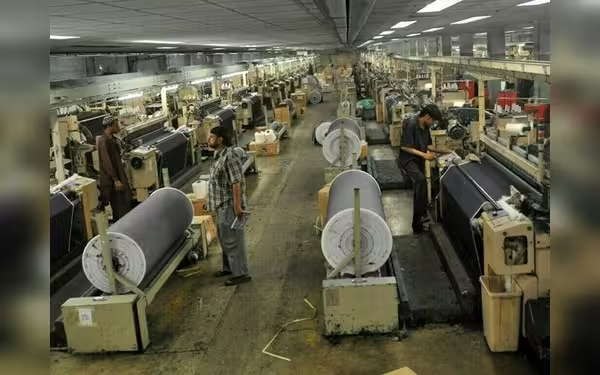Sunday, July 7, 2024 10:41 AM
Muhammad Javed Bilwani criticizes Pakistan's tax policies
- Closure of Naz Textiles due to high production costs and lack of orders
- Warning of more closures and decline in exports if policies unchanged
- Urgent need for reforms to support Pakistan's export industry
 Image Credits: brecorder
Image Credits: brecorderThe closure of Naz Textiles in Karachi due to high production costs and lack of orders highlights the challenges faced by Pakistan's export industry. Muhammad Javed Bilwani criticizes the government's tax policies and warns of more closures, emphasizing the urgent need for reforms to support the nation's export capabilities.
In the wake of Pakistan's ongoing economic challenges, the closure of a textile unit in Karachi has raised concerns about the country's export industry. Naz Textiles (Private) Ltd, a prominent player in the sector, recently announced its decision to shut down due to mounting losses attributed to a lack of orders. This development signals a broader crisis affecting similar companies, with implications for the nation's export capabilities.
The closure of Naz Textiles, as confirmed by Muhammad Javed Bilwani, the Chief Coordinator for All Export Associations of Pakistan, underscores the harsh realities facing the industry. High taxation rates, coupled with soaring fuel, electricity, and gas costs, have severely impacted industrial production. Bilwani warns that unless significant changes are made, more companies may be forced to cease operations, leading to a sharp decline in exports over the coming months.
Bilwani's criticism of the government's tax policies highlights the challenges faced by exporters in Pakistan. The lack of adequate refunds, along with the removal of key export facilitation schemes, has created a hostile business environment. These factors, combined with new tax regulations, have further complicated matters for companies like Naz Textiles, pushing them towards closure.
The burden of taxation has not only hindered operational efficiency but has also driven up costs for businesses. Bilwani cautions that if current economic policies persist, Pakistan risks a reduction in industrial activity and an increase in imports, potentially reshaping the country's economic landscape. Despite its efforts to stay afloat, Naz Textiles succumbed to the pressures of rising production costs and dwindling orders, marking the end of an era for the company.
The closure of Naz Textiles serves as a stark reminder of the challenges facing Pakistan's export industry. As the country grapples with economic uncertainties, policymakers must address the issues of high taxation and escalating production costs to prevent further closures and safeguard the nation's export capabilities. The fate of Naz Textiles underscores the urgent need for reforms to support businesses and ensure a sustainable future for Pakistan's industrial sector.













